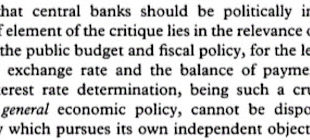You know that scene in The Big Short, when after the collapse there's a distinct vibe of "man that was so obvious, how were people so impossibly stupid?"If you are loaning money to the Federal Government (ie if you own government bonds), the *only* reason you should feel… https://t.co/KgutE7xeIv— Erik Voorhees (@ErikVoorhees) May 3, 2024
Read More »MMT and the Wealth of Nations, Revisited
Steve Roth (at Asymptosis) I just had occasion, in replying to a correspondent, to reiterate much of the thinking in my recent MMT Conference presentation. I thought it might be a useful and comprehensible form for some readers, so I’m reproducing it here. I’ve also explained this at somewhat painful length here. Correct me if I am wrong but what you are saying extends MMT into the private sector. The govt boosts balance sheets with...
Read More »On central bank independence, and Brazilian monetary policy
The issue is back in the news. This time in Brazil (it was briefly an issue here when Trump did not reappoint Yellen, and then complained about Powell's interest rate where too high). At any rate, I always thought that there were good reasons for skepticism about central bank independence (CBI). As noted by Massimo Pivetti in this old piece on the Maastricht Accord and the, at that time, plan for the euro, the main reason to be doubtful is related to the interaction of monetary policy and...
Read More »International Trade and MMT with Keen, Hudson
Macro and Cheese pod, July 9 2022. Michael Hudson A central tenet of the World Bank from the beginning is to convince countries not to grow their own food, but to create plantation agriculture to prevent family-owned farming of food, to grow plantation export crops and they become dependent on the United States for their grain. Steve Keen If you look at just the shipping involved in international trade, it’s something of the order of 20%, I think, of our carbon...
Read More »Modern Money Theory in the Tropics: A Reply to Agustin Mario
Our reply to a very inaccurate discussion of our views on MMT by Agustin Mario. From the abstract:This paper responds to some inaccuracies on the discussion of our views on Modern Money Theory (MMT), as discussed by Agustin Mario. We believe that while is correct in noting that autonomous spending generates taxes, and fiscal balances are a result, MMT authors overlook the difficulties in pursuing expansionary fiscal policy in the developing countries. These are limited by the existence of an...
Read More »Monetary Sovereignty, Sanctions and Russian Economic Policy
Monetary Sovereignty, Sanctions and Russian Economic Policy The central role of economic sanctions in the US/EU strategy against Russia has returned international political economy to the center stage if it had ever left it. Here are some thoughts occasioned by Adam Tooze’s interesting analysis of Modern Monetary Theory (MMT) as perceived by the Russian economic policy apparatus, connected to the role of monetary reform in the anti-colonial...
Read More »Join Us for the 2022 Levy Institute Summer Seminar
The Levy Economics Institute of Bard College is pleased to announce it will be holding a summer seminar June 11–18, 2022. Through lectures, hands-on workshops, and breakout groups, the seminar will provide an opportunity to engage with the theory and policy of Modern Money Theory (MMT) and the work of Institute Distinguished Scholars Hyman Minsky and Wynne Godley. Intended for those who are introducing themselves to these approaches as well as those who are looking to deepen their...
Read More »Join Us for the 2022 Levy Institute Summer Seminar
The Levy Economics Institute of Bard College is pleased to announce it will be holding a summer seminar June 11–18, 2022. Through lectures, hands-on workshops, and breakout groups, the seminar will provide an opportunity to engage with the theory and policy of Modern Money Theory (MMT) and the work of Institute Distinguished Scholars Hyman Minsky and Wynne Godley. Intended for those who are introducing themselves to these approaches as well as those who are looking to deepen their...
Read More »Are Concerns over Growing Federal Government Debt Misplaced?
L. Randall Wray | November 10, 2021 If the global financial crisis (GFC) of the mid-to-late 2000s and the COVID crisis of the past couple of years have taught us anything, it is that Uncle Sam cannot run out of money. During the GFC, the Federal Reserve lent and spent over $29 trillion to bail out the world’s financial system,[1] and then trillions more in various rounds of “unconventional” monetary policy known as quantitative easing.[2] During the COVID crisis, the...
Read More »Are Concerns over Growing Federal Government Debt Misplaced?
L. Randall Wray | November 10, 2021 If the global financial crisis (GFC) of the mid-to-late 2000s and the COVID crisis of the past couple of years have taught us anything, it is that Uncle Sam cannot run out of money. During the GFC, the Federal Reserve lent and spent over $29 trillion to bail out the world’s financial system,[1] and then trillions more in various rounds of “unconventional” monetary policy known as quantitative easing.[2] During the COVID crisis, the...
Read More » Heterodox
Heterodox




